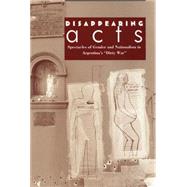- ISBN: 9780822318682 | 0822318687
- Cover: Paperback
- Copyright: 3/1/1997
In Disappearing Acts, Diana Taylor looks at how national identity is shaped, gendered, and contested through spectacle and spectatorship. The specific identity in question is that of Argentina, and Taylor's focus is directed toward the years 1976 to 1983 in which the Argentine armed forces were pitted against the Argentine people in that nation's 'Dirty War'. Combining feminism, cultural studies, and performance theory, Taylor analyses the political spectacles that comprised the war - concentration camps, torture, 'disappearances' - as well as the rise of theatrical productions, demonstrations, and other performative practices that attempted to resist and subvert the Argentine military. Taylor uses performance theory to explore how public spectacle both builds and dismantles a sense of national and gender identity. Here, nation is understood as a product of communal 'imaginings' that are rehearsed, written, and staged - and spectacle is the desiring machine at work in those imaginings. Taylor argues that the founding scenario of Argentineness stages the struggle for national identity as a battle between men - fought on, over, and through the feminine body of the Motherland. She shows how the military's representations of itself as the model of national authenticity established the parameters of the conflict in the 70s and 80s, feminised the enemy, and positioned the public - limiting its ability to respond. Those who challenged the dictatorship, from the Mothers of the Plaza de Mayo to progressive theater practitioners, found themselves in what Taylor describes as 'bad scripts.' This telling analysis of the aesthetics of violence and the disappearance of civil society during Argentina's spectacle of terror will interest students and scholars - including sociologists, anthropologists, political scientists, psychologists, and feminist, postcolonial, and literary critics - concerned with issues of power and the interrelations of gender and nationhood.







